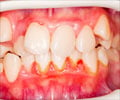Keeping teeth clean and sparkling can reduce your chances of developing heart disease, says a new study, which explains the link with gum problems.
Keeping teeth clean and sparkling can reduce your chances of developing heart disease, says a new study, which explains the link with gum problems.
The study's researchers have discovered the link between gum disease and heart disease that may help find ways to save lives.he research has been presented at the Society for General Microbiology's Autumn meeting being held this week at Trinity College, Dublin.
In recent years chronic infections have been associated with a disease that causes "furring" of the arteries, called atherosclerosis, which is the main cause of heart attacks.
A number of theories have been put forward to explain the link between oral infection and heart disease," said Professor Greg Seymour from the University of Otago Dunedin, New Zealand.
"One of these is that certain proteins from bacteria initiate atherosclerosis and help it progress. We wanted to see if this is the case, so we looked at
the role of heat shock proteins," Greg added.
Advertisement
They can work as chaperone molecules, stabilising other proteins, helping to fold them and transport them across cell membranes. Some also bind to foreign antigens and present them to immune cells.
Advertisement
"When this happens, white blood cells can build up in the tissues of the arteries, causing atherosclerosis," said Professor Seymour.
"We found white blood cells called T cells in the lesions of arteries in patients affected by atherosclerosis. These T cells were able to bind to host heat shock proteins as well as those from bacteria that cause gum disease. This suggests that the similarity between the proteins could be the link between oral infection and atherosclerosis," said Professor Seymour.
The molecular mimicry means that when the immune system reacts to oral infection, it also attacks host proteins, causing arterial disease. These findings could fundamentally change health policy, highlighting the importance of adult oral health to overall health and wellbeing: control of gum disease should be essential in reducing the risk of heart disease.
Source-ANI
SRM














